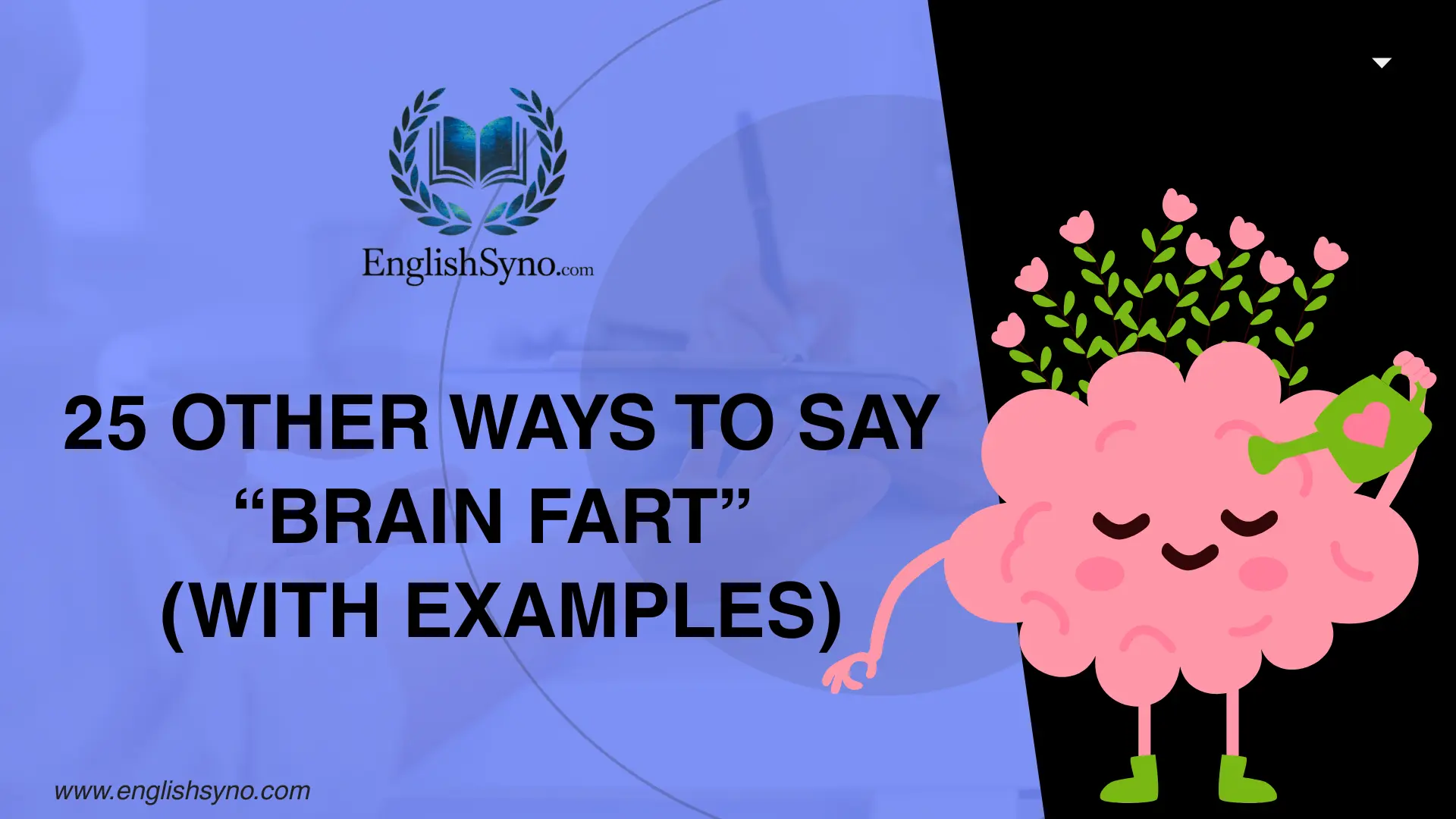I’ve often found myself walking into a room and suddenly realizing I have no idea why I’m there or what I’m doing, a temporary, mental lapse-a classic brain fart-that can leave anyone stupid or confused.
Having experienced these quirky, cognitive hiccups over the years, I noticed a distinct uptick since I turned 40, ahem, with brief instances of forgetfulness like introducing someone by the wrong name or misplacing a pan while cooking.
Experts talked about how our brains conspire during such occasions, producing random, unconsidered brainfarts that leave us frustrated. People call them farts, a slang term for failures in reasoning or mistakes in thinking.
I noticed in a recent interview a forensic scientist describing errors during peer review as total brain farts. Instances like burned food or incorrectly spelling a name happen to the smartest humans, sometimes first in the 1950s or even five years ago, and though quirky, rude, and natural, explaining them helps correct perspective, letting us laugh, feel, and look at ourselves lightly.
What Does “Brain Fart” Mean?
A brain fart refers to a temporary mental lapse, a moment when your mind seems to fail you in recalling information, reasoning correctly, or acting with clarity. It’s usually harmless, often brief, and can happen to anyone, regardless of intelligence or experience. People use it to describe moments of forgetfulness, confusion, or quirky cognitive hiccups.
When to Use “Brain Fart”
You can use brain fart in casual settings when describing your own mental lapse or that of someone familiar. It’s often used humorously among friends, colleagues, or in informal writing. Avoid it in highly professional or serious contexts, especially when discussing critical errors.
Is It Professional/Polite to Say “Brain Fart”?
While a brain fart is commonly understood, it’s generally considered slang and informal. Use it with caution in workplaces or professional communications. It works best among peers or in personal conversations where lighthearted language is appreciated.
Pros or Cons
Pros:
- Adds humor to a situation
- Expresses human fallibility
- Lightens the mood
Cons:
- Informal and potentially unprofessional
- It may sound rude in formal contexts
- It can be misunderstood if the audience is unfamiliar with the slang
Mental lapse
Meaning/Definition: A momentary failure of memory or judgment.
Example: “I had a mental lapse and forgot my keys at home.”
Best Use: Casual explanation of forgetfulness
Worst Use: Formal business report
Tone: Neutral, factual
Cognitive hiccup
Meaning/Definition: A brief, quirky interruption in thinking or memory.
Example: “My mind experienced a cognitive hiccup during the presentation.”
Best Use: Professional yet light description of temporary confusion
Worst Use: Serious medical discussion
Tone: Light, informal, scientific
Brain glitch
Meaning/Definition: A sudden, temporary error in thinking.
Example: “Sorry, that was a brain glitch on my part.”
Best Use: Informal, self-deprecating
Worst Use: Technical documents
Tone: Casual, humorous
Memory blip
Meaning/Definition: A small, brief failure to recall something.
Example: “I had a memory blip and forgot your name for a second.”
Best Use: Everyday conversations
Worst Use: Serious academic writing
Tone: Light, apologetic
Mind blank
Meaning/Definition: A moment when the mind draws a complete blank.
Example: “I went completely mind blank during the test.”
Best Use: Humorously describing forgetfulness
Worst Use: In formal communication
Tone: Casual, relatable
Senior moment
Meaning/Definition: Playful phrase for occasional forgetfulness, often linked humorously to aging.
Example: “Must be a senior moment-I forgot where I put my glasses.”
Best Use: Lighthearted, humorous contexts
Worst Use: Professional criticism
Tone: Joking, casual
Mental hiccup
Meaning/Definition: A temporary failure in mental performance.
Example: “I had a mental hiccup and sent the wrong file.”
Best Use: Friendly or informal settings
Worst Use: Formal reports
Tone: Casual, descriptive
Momentary lapse
Meaning/Definition: Short-term loss of focus or clarity.
Example: “That was just a momentary lapse, nothing serious.”
Best Use: Polite, neutral explanation
Worst Use: Repeated mistakes
Tone: Neutral, apologetic
Temporary blackout
Meaning/Definition: Short period when memory or thought fails.
Example: “I had a temporary blackout and forgot the answer.”
Best Use: Humor or self-deprecation
Worst Use: Professional medical report
Tone: Light, humorous
Forgetful slip
Meaning/Definition: A minor instance of forgetting.
Example: “I made a forgetful slip and left the oven on.”
Best Use: Casual explanation
Worst Use: Legal or formal contexts
Tone: Gentle, apologetic
Mental stumble
Meaning/Definition: A brief stumbling of thought or judgment.
Example: “Had a mental stumble when answering that question.”
Best Use: Informal or storytelling
Worst Use: Formal documentation
Tone: Light, descriptive
Brain freeze
Meaning/Definition: Sudden, temporary inability to think clearly.
Example: “I experienced a brain freeze during the presentation.”
Best Use: Casual, humorous
Worst Use: Professional report
Tone: Light, funny
Thought hiccup
Meaning/Definition: A small, brief interruption in thinking.
Example: “Just a thought hiccup, I’ll get back on track.”
Best Use: Friendly explanations
Worst Use: Serious error analysis
Tone: Casual, gentle
Mental fog
Meaning/Definition: Temporary confusion or inability to focus.
Example: “After waking up, I had a mental fog and couldn’t concentrate.”
Best Use: Describing tiredness or distraction
Worst Use: Technical writing
Tone: Light, descriptive
Slip of the mind
Meaning/Definition: Small momentary forgetfulness.
Example: “It was a slip of the mind; I forgot your email.”
Best Use: Polite and casual
Worst Use: Repeated errors in work
Tone: Gentle, apologetic
Brain lapse
Meaning/Definition: A temporary failure in thought or memory.
Example: “I had a brain lapse and missed the appointment.”
Best Use: Informal, self-deprecating
Worst Use: Formal technical reports
Tone: Casual, apologetic
Mind glitch
Meaning/Definition: Temporary failure in mental function.
Example: “Experienced a mind glitch while solving the problem.”
Best Use: Humor or casual explanation
Worst Use: Serious professional contexts
Tone: Light, informal
Cognitive pause
Meaning/Definition: A Short break in the thought process or decision-making.
Example: “I took a cognitive pause and then remembered the instructions.”
Best Use: Professional yet informal
Worst Use: Urgent scenarios
Tone: Neutral, descriptive
Mental hiccup
Meaning/Definition: A Brief interruption in mental clarity or function.
Example: “I had a mental hiccup and typed the wrong address.”
Best Use: Everyday informal communication
Worst Use: Serious documentation
Tone: Casual, explanatory
Brain blank
Meaning/Definition: Momentary failure to recall information.
Example: “Hit a brain blank and forgot the password.”
Best Use: Self-deprecating, humorous
Worst Use: Academic testing reports
Tone: Light, relatable
Memory lapse
Meaning/Definition: Temporary failure to remember something.
Example: “It was a memory lapse, I didn’t see the message.”
Best Use: Neutral, polite
Worst Use: Repeated critical mistakes
Tone: Gentle, neutral
Thought lapse
Meaning/Definition: Short loss of focus or clarity in thinking.
Example: “Had a thought lapse during the discussion.”
Best Use: Friendly or neutral explanations
Worst Use: Serious professional evaluations
Tone: Casual, descriptive
Mind hiccup
Meaning/Definition: A temporary stumble in thought or reasoning.
Example: “Just a mind hiccup, I’ll correct it now.”
Best Use: Informal, friendly
Worst Use: Critical contexts
Tone: Light, apologetic
Brain fog
Meaning/Definition: Temporary confusion or lack of clarity in thought.
Example: “Woke up with brain fog and couldn’t concentrate.”
Best Use: Casual, descriptive
Worst Use: Formal analysis
Tone: Light, relatable
Forgetfulness moment
Meaning/Definition: A brief moment of forgetting.
Example: “A forgetfulness moment made me misplace my keys.”
Best Use: Everyday casual communication
Worst Use: Professional or legal contexts
Tone: Gentle, lighthearted
Final Thoughts
Everyone experiences a brain fart from time to time-it’s a natural part of being human. These temporary mental lapses remind us that no matter how intelligent or experienced we are, our brains can occasionally hiccup, leaving us momentarily forgetful, confused, or slightly embarrassed. Understanding that these moments are universal helps us approach them with humor, patience, and empathy rather than self-criticism.
Using alternative phrases like mental lapse, cognitive hiccup, brain freeze, or memory blip allows us to communicate these moments in a way that fits the tone, audience, and context. Whether you’re joking with friends, sharing a story at work, or writing informally online, choosing the right term can lighten the mood and normalize these quirky cognitive interruptions.
It’s also worth noting that brain farts are not always signs of aging or mental decline-they can happen to anyone, at any age, often due to fatigue, stress, distraction, or multitasking. Recognizing them as temporary and harmless reduces frustration and helps maintain perspective.
Ultimately, embracing these small cognitive hiccups encourages self-compassion and social connection. Laughing at a brain fart, sharing a relatable story, or even giving someone the benefit of the doubt during a momentary lapse creates a lighter, more understanding environment. So next time your mind goes blank or you misplace something, remember it’s just a brain fart. A small pause, a quirky moment, and then life goes on. Being aware and gentle with yourself turns these little lapses into opportunities for humor, reflection, and kindness.
FAQs About Brain Farts
What exactly is a brain fart?
A brain fart is a temporary lapse in memory, focus, or reasoning. It’s a harmless cognitive hiccup that can happen to anyone, often causing brief confusion, forgetfulness, or mistakes.
Are brain farts normal?
Yes! Brain farts are common and natural. They happen to people of all ages, typically triggered by fatigue, stress, distraction, or multitasking.
Can brain farts indicate mental decline?
Occasional brain farts are not a sign of mental decline. They’re normal cognitive lapses. Persistent memory problems may need professional evaluation.
Why do brain farts happen more with age?
Age can slightly slow memory recall, but lifestyle factors like stress, fatigue, and multitasking are often the main causes, not age itself.
Are brain farts the same as forgetfulness?
Yes, in casual terms. A brain fart is a brief, momentary lapse in memory or reasoning, while chronic forgetfulness may require attention.
How can I prevent brain farts?
Get enough rest, reduce stress, avoid multitasking, and practice mindfulness. Staying organized can also minimize temporary lapses.
Can stress cause brain farts?
Absolutely. High stress can temporarily impair focus, memory, and decision-making, increasing the likelihood of a brain fart.
Is it polite to say “brain fart” at work?
It depends on context. It’s informal and works with colleagues you know well, but avoid it in formal or professional reports.
What are alternative phrases for brain fart?
Alternatives include mental lapse, cognitive hiccup, mind blank, memory blip, and brain freeze, suitable for casual or professional use depending on tone.
Can brain farts happen during tests or presentations?
Yes. Temporary cognitive lapses are common in high-pressure situations, causing sudden forgetfulness or pauses in thinking.
Are brain farts linked to fatigue?
Yes. Sleep deprivation and mental exhaustion can significantly increase the frequency of brain farts.
Can children experience brain farts?
Yes. Children can have brief memory lapses or mental hiccups, just like adults, often due to distraction or fatigue.
How do I respond to someone else’s brain fart?
Respond with patience, humor, or understanding. Lighthearted acknowledgment is usually best, unless it’s a serious situation.
Are brain farts dangerous?
No, they are harmless and temporary. They become concerning only if memory lapses are persistent or severe.
Can mindfulness reduce brain farts?
Yes. Mindfulness and focused attention help improve memory recall, reduce mental fatigue, and lower the frequency of cognitive lapses.

Muhammad Altaf is an English language specialist and professional content strategist with over 10 years of experience writing and teaching practical English usage, professional communication, and tone awareness. His work focuses on helping readers express ideas clearly, naturally, and confidently in real-world contexts.


